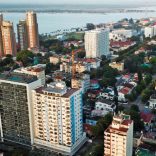Mozambique: Medium-Term Debt Management Strategy is crucial for macroeconomic credibility, says CTA
No contracts yet signed with Proindicus – AIM report

The companies exploring hydrocarbons in the Rovuma Basin, off the coast of the northern Mozambican province of Cabo Delgado, to date have signed no contracts to buy security services from Proindicus, one of the companies set up with secretive loans guaranteed by the government of former President Armando Guebuza, reports the latest issue of the independent weekly ‘Savana’.
Proindicus obtained loans of US$622 million from Credit Suisse and from the Russian bank VTB. Should it default on repaying these loans, the Mozambican state becomes liable thanks to the guarantee granted by the Guebuza government.
The loan was used to buy boats for security purposes, as well as aircraft and radar systems. Back in April, when the loan became public knowledge, the government spokesperson, Deputy Health Minister Mouzinho Saide, said that, when Proindicus was set up, “the country was facing security threats such as piracy, illegal immigration, drug trafficking and illegal fishing”. The government thought it necessary to guarantee security for the assets of the oil and gas companies operating in Mozambican waters.
Closely linked to Proindicus is the company Mozambique Asset Management (MAM), which was intended to operate naval installations to assist the vessels of Proindicus and of the Mozambique Tuna Company (EMATUM). Saide said that MAM would operate a mobile dock specialising in maintenance. MAM obtained a loan of US$535 million from the same two banks.
This all depends on operators in the Rovuma Basin, and elsewhere in the Mozambique Channel, buying services from Proindicus and MAM. A Credit Suisse memorandum of February 2013, leaked to the media, optimistically assumed that there would be no problems in repaying the loans because companies would buy the services offered.
The memorandum declared that “as the project is expected to be self-funding, there will be no funding pressures on the government, nor will a need to reallocate resources from other basic infrastructure projects be triggered”.
The Credit Suisse document went into great detail as to how money would be raised. It stated “The main sources of revenue are expected to be fees payable by companies with assets within the Mozambican Exclusive Economic Zone (EEZ), such as rigs, and fees payable by vessels in transit, which are currently paid to third party insurance companies. In addition, inbound container charges will be another key revenue sources”.
A key assumption was that hydrocarbon companies would pay an annual fee of three million dollars per rig. In addition, vessels in transit along the Mozambique Channel would be charged a fee for security services. Credit Suisse believed there would be “a high take-up of this service, which will be cost-effective for the companies”.
All vessels over 100,000 tonnes would pay this fee, which the memorandum estimated would bring in US$30.6 million a year. Tourist boats, fishing boats and containers unloaded at Mozambican ports would also pay a fee.
But to date the two main oil and gas companies operating in the Rovuma Basin, the American company Anadarko, and ENI of Italy, have signed no contracts with Proindicus, and the Anadarko sources cited by ‘Savana’ were distinctly skeptical. They admitted that the Proindicus interceptor boats are very fast, but were critical of their lack of effective electronic weaponry.
One of the sources cited by the paper said “Yes, they’re very fast, but there’s a preponderant aspect which they perhaps forgot – lack of armament. Even if they put out to the high seas to intercept, what are they going to do? They could even have a team of armed soldiers on board, but the efficiency is not the same as that of a boat which possesses specific electronic armament for missions of this kind”.
However, a source linked to the design of the project told “Savana” that the Proindicus boats do not really have an “armed function”. That is the job of the Mozambican defence and security forces. Proindicus can inspect, screen and intercept, but it remains a civilian company, and armed operations should be in the hands of the Mozambican navy.
The paper’s sources said that Anadarko might look elsewhere to purchase security services – which would be a serious blow to Proindicus.
Several Proindicus boats are moored in Pemba, the Cabo Delgado provincial capital. Six are sizeable – three Ocean Eagle 43s and three HSI (High Speed Interceptor) 32s. These vessels can travel for up to 700 nautical miles at an average speed of 30 knots. Sailors trained to operate these boats told “Savana” this means that they can go from Pemba to Beira without refueling.
Unlike the Anadarko sources, these sailors believed the boats can deal with pirates. “They are boats with the specific mission to intercept”, they said. “They have high speed to pursue pirates and deliver them to the relevant authorities”.
There are also smaller, DV-15 interceptors, and four of these in Pemba are being used to train members of the Mozambican navy. ‘Savana’ says these sailors will later operate the boats in the name of Proindicus, under a memorandum of understanding between the company and the Defence Ministry.












Leave a Reply
Be the First to Comment!
You must be logged in to post a comment.
You must be logged in to post a comment.